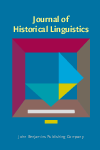
Journal of Historical Linguistics
metrics 2024
Pioneering Research in Historical Linguistics
Introduction
Journal of Historical Linguistics, published by JOHN BENJAMINS PUBLISHING CO, is an esteemed peer-reviewed journal that has carved a niche in the intricate field of linguistics and language. With its ISSN 2210-2116 and E-ISSN 2210-2124, the journal has made significant contributions since its inception in 2011, continuing its impactful discourse until 2024. Located in the Netherlands, the journal showcases a commitment to advancing our understanding of language evolution, change, and historical linguistics, providing invaluable insights for researchers, professionals, and students alike. As demonstrated by its commendable rankings—placing it in the Q3 quartile for linguistics and language with a Scopus rank of #275 out of 1088—this journal stands as a critical resource for those invested in the empirical and theoretical aspects of language history. Its accessibility enhances its reach, allowing for a wider distribution of knowledge in this vital scholarly area.
Metrics 2024
 0.15
0.15 0.50
0.50 0.50
0.50 11
11Metrics History
Rank 2024
Scopus
JCI (Web Of Science)
Quartile History
Similar Journals
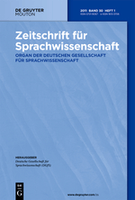
Zeitschrift fur Sprachwissenschaft
Exploring the nuances of language and communication.Zeitschrift für Sprachwissenschaft, published by DE GRUYTER MOUTON, is a leading journal in the field of linguistics that has been contributing to scholarly discourse since its inception in 1982. With an ISSN of 0721-9067 and an E-ISSN of 1613-3706, the journal offers an Open Access model since 2017, ensuring widespread dissemination of research findings. Positioned in Q2 of the Linguistics and Language category for 2023, it ranks #312 out of 1088 in the Arts and Humanities and #370 out of 1167 in Social Sciences, reflecting its robust impact and contribution to the field. This German-based journal covers a diverse range of topics related to language and linguistics, appealing to researchers, professionals, and students alike. By fostering interdisciplinary dialogue and showcasing innovative research, Zeitschrift für Sprachwissenschaft plays a critical role in advancing our understanding of language in various contexts. The journal is located at Genthiner Strasse 13, 10785 Berlin, Germany, inviting scholars globally to contribute to its mission of enhancing linguistics research.

SKASE Journal of Theoretical Linguistics
Bridging Heritage and Modernity in Linguistic ScholarshipSKASE Journal of Theoretical Linguistics, published by the SLOVAK ASSOCIATION STUDY ENGLISH-SKASE, is a distinguished Open Access journal that expands the horizons of linguistic research and theoretical frameworks. With its ISSN N/A and E-ISSN 1336-782X, the journal has established itself as a pivotal resource for scholars in the field, achieving a commendable Q2 ranking in Linguistics and Language as of 2023. The journal, which has been in continuous publication since 2017, actively publishes innovative research studies, reviews, and theoretical discussions, easing access to groundbreaking work for academics and practitioners alike. Based in Slovakia, it connects a rich heritage of linguistic scholarship and is indexed in Scopus, ranking alongside its peers in both Arts and Humanities and Social Sciences categories. The SKASE Journal of Theoretical Linguistics is crucial for anyone interested in the evolving landscapes of linguistics, serving as an invaluable platform for disseminating knowledge and fostering collaboration amongst researchers worldwide.

JOURNAL OF EAST ASIAN LINGUISTICS
Delving into the Complexities of East Asian LinguisticsJOURNAL OF EAST ASIAN LINGUISTICS, published by SPRINGER, is a premier academic journal that focuses on the rich and diverse linguistic phenomena from East Asia. With an ISSN of 0925-8558 and an E-ISSN of 1572-8560, this journal has steadily contributed to the fields of linguistics and the history and philosophy of science since its inception in 1992. Operating from its base in the Netherlands, the journal is recognized for its impactful research, holding a Q2 category ranking in both the History and Philosophy of Science and Linguistics and Language. It boasts an impressive standing in Scopus rankings, highlighting its relevance and contribution to the academic community with a 66th percentile ranking in Language and Linguistics. The journal is not currently open access, ensuring a rigorous peer-review process that elevates the quality of published articles. By bridging theory and empirical research, the JOURNAL OF EAST ASIAN LINGUISTICS plays a vital role in advancing knowledge in linguistics, making it an essential resource for researchers, professionals, and students interested in East Asian languages and their complexities.

Jezikoslovlje
Unveiling the Dynamics of Language and SocietyJezikoslovlje, published by the Josip Juraj Strossmayer University, Faculty of Philosophy in Croatia, is an essential publication in the field of Linguistics and Language Studies. Launched in 2008 and extending its contributions to the academic community through 2024, this journal addresses a spectrum of linguistic research, facilitating scholarly dialogue around both theoretical and applied aspects of language. With a current Scopus ranking placing it in the 54th percentile in the Arts and Humanities and the 50th percentile in Social Sciences, Jezikoslovlje serves as a vital resource for researchers and students looking to engage with contemporary linguistic issues. Although it operates under a traditional access model, its indexed presence and rigorous peer-review process ensure that published works maintain a high scholarly standard, inviting contributions that advance understanding in this dynamic discipline. The journal's commitment to fostering knowledge in linguistics makes it a significant platform for academics in Croatia and beyond.

Journal of Portuguese Linguistics
Illuminating the Nuances of Portuguese LinguisticsThe Journal of Portuguese Linguistics is an esteemed peer-reviewed academic journal published by UBIQUITY PRESS LTD, dedicated to the exploration of the rich complexities of the Portuguese language and its various linguistic dimensions. With an ISSN of 1645-4537 and an E-ISSN of 2397-5563, this open-access journal has been disseminating valuable research since 2002, ensuring that knowledge is accessible to all scholars, professionals, and students interested in Linguistics. Based in Portugal, it features a distinct focus on the linguistics pertinent to the Portuguese language, facilitating discussions that span theoretical and applied interests. The journal holds a respectable Q3 quartile rank in the field of Linguistics and Language, reflecting its growing significance and contribution to academia, as evidenced by Scopus rankings that place it in the 71st and 68th percentiles in Arts and Humanities as well as Social Sciences. Researchers and practitioners alike will find Journal of Portuguese Linguistics to be an indispensable resource for fostering discourse and innovation in the study of language.
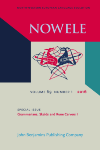
NOWELE-North-Western European Language Evolution
Exploring the Evolution of Language DynamicsNOWELE-North-Western European Language Evolution, published by John Benjamins Publishing Co, serves as a vital platform for researchers and scholars interested in the evolution and dynamics of North-Western European languages. With an ISSN of 0108-8416 and an E-ISSN of 2212-9715, this journal has been contributing to the field of linguistics since its inception in 1983, with ongoing publications until 2024. Indexed in Scopus and classified in the Q3 category for Linguistics and Language, NOWELE is recognized for its rigorous academic standards and diverse contributions, ranking #485 out of 1088 in the Arts and Humanities category, and #566 out of 1167 in Social Sciences. The journal fosters an open dialogue within the linguistic community, presenting innovative research findings and theoretical advancements. Researchers, professionals, and students alike benefit from its systematic exploration of language evolution in the context of a rapidly changing global linguistic landscape.
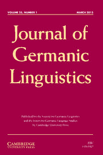
Journal of Germanic Linguistics
Shaping the Future of Linguistic ScholarshipThe Journal of Germanic Linguistics, published by Cambridge University Press, is a premier academic journal dedicated to advancing scholarship in the field of linguistics with a particular focus on Germanic languages. With an impressive impact factor and a well-established reputation, this journal attracts contributions from leading researchers and professionals who delve into the complexities of language, syntax, semantics, and phonology. The journal holds a prominent position in its category, recognized as Q2 in Linguistics and Language and Q1 in Literature and Literary Theory according to latest rankings. By fostering innovative research, the Journal of Germanic Linguistics plays a crucial role in shaping the discourse around Germanic linguistics, providing an essential platform for both emerging scholars and seasoned academics alike. Although it does not offer Open Access options, it continues to be a vital resource for the global academic community, with a convergence of works published throughout its history from 2001 to 2007 and again from 2009 to 2024, ensuring an enriching repository of research for future generations.

Lingue e Linguaggio
Illuminating the Intersections of Language and SocietyLingue e Linguaggio, published by SOC ED IL MULINO, is a distinguished academic journal in the field of Linguistics and Language, hailing from Bologna, Italy. With an esteemed Q2 ranking in its category as of 2023, this journal is recognized for its contributions to both the arts and humanities as well as social sciences, achieving notable positions within Scopus rankings. It serves as a vital platform for researchers, practitioners, and students interested in exploring various linguistic phenomena, language dynamics, and theoretical frameworks. Although it operates under a traditional subscription model rather than open access, its comprehensive array of studies and publications provides significant insights and fosters academic discourse. With a publication period extending from 2002 to 2024, Lingue e Linguaggio continues to be a key resource for advancing the understanding of language in contemporary contexts.
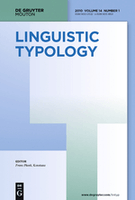
Linguistic Typology
Illuminating the Complexities of Linguistic DiversityLinguistic Typology is a premier journal focused on the comparative study of language structures and the classification of languages, published by Walter de Gruyter GmbH in Germany. Since its inception in 1997, the journal has established itself as a leading platform in the field of linguistics, achieving a remarkable Q1 category ranking in both Linguistics and Language for 2023, reflecting its impact and relevance among scholars. With a notable position in the academic community, evidenced by its 91st percentile rank in Arts and Humanities and 90th percentile in Social Sciences according to Scopus, Linguistic Typology invites contributions that explore the rich diversity of language structures, promoting a deeper understanding of linguistic phenomena across various cultures. While currently not offering open access, the journal remains a pivotal resource for researchers, professionals, and students aiming to advance their knowledge in the dynamic field of linguistics. For more information, deliverables, and submission guidelines, please visit the journal's official page.

Language and Linguistics
Connecting Cultures through Linguistic ResearchLanguage and Linguistics is a leading academic journal published by ACAD SINICA, INST LINGUISTICS, based in Taiwan. Established in 2008, this journal has rapidly gained recognition within the field of linguistics, achieving a commendable ranking of Q2 in the 2023 category quartiles and holding positions in the top percentiles of Scopus rankings for both Arts and Humanities and Social Sciences. With an ISSN of 1606-822X and an E-ISSN of 2309-5067, the journal aims to foster the development of linguistics research by providing a platform for the dissemination of innovative and interdisciplinary studies. While it currently operates on a traditional subscription model, its significant contribution to the advancement of linguistic theory and its applications makes it an invaluable resource for researchers, professionals, and students alike. Spanning converged years from 2008 to 2024, Language and Linguistics continues to shape the dialogue in understanding language phenomena and encourages submissions that push the boundaries of current linguistic knowledge.